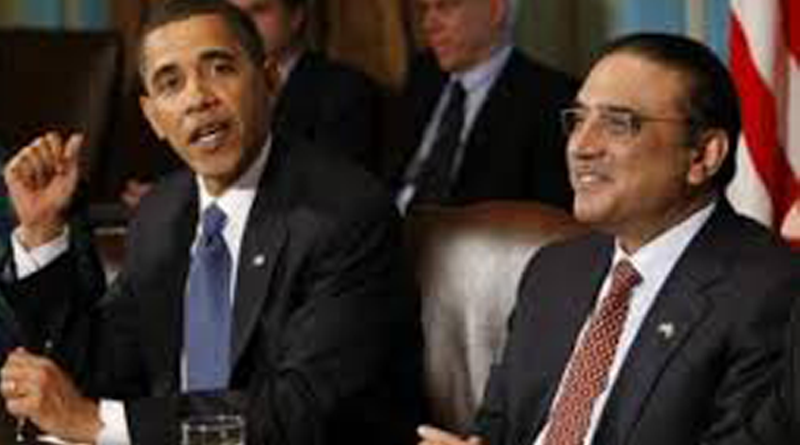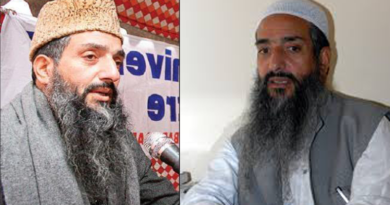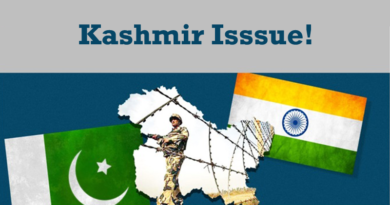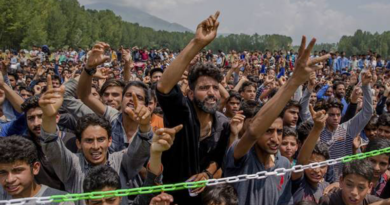President Zardari Captures the Essence of Pakistan’s Commitment to Kashmir
In his address to the legislative assembly of Azad Kashmir at Muzaffarabad on 5th January, 2009, the president of Pakistan Mr Asif Ali Zardari, has made some very important points injecting new hope and energy into the Kashmiri freedom struggle. Apart from the routine stuff, and promises to AJK government, the president said something very meaningful, not often articulated by Pakistani rulers.
He said that earlier in history we achieved Pakistan amidst all the deadly opposition, we will liberate Kashmir in the same way, and we are duty bound to do that. There was a clear element of real time sequencing between the two tasks in his words: We did something earlier (got Pakistan), something is yet to be done (liberating Kashmir), and we will do that as part of our duty.
This was not a policy statement, so we will not look at it in terms of Pakistan’s official position on Kashmir, our interest is more profound, and concerns much deeper and wider. It is in that sense that we believe President’s speech deserves to be put in the perspective, and accordingly appreciated. By saying what has been mentioned above, the President has caught the bull by horn, and has very succinctly captured the essence of Pakistan’s commitment to Kashmir.
Mahazi-Islami has all along held the view that Kashmir issue, no doubt, relates to Kashmiri people because they have to choose their political future, but when we look at it as a job to be done, a task to be accomplished, a result to be delivered, it is primarily Pakistan’s issue; Kashmiri people are in a supportive role. It is not our opinion; it is a fact which will be endorsed by anyone looking at the Kashmir issue in a scientific and non-partisan way. It may need to be recalled that it was precisely to highlight and emphasize this basic point that Mahazi-Islami held a one day world conference on 21st April, 2001 at School of Oriental and African Studies (SOAS) in London (U.K.). The point was, and remains, that Pakistan has historically emerged as a vanguard in the movement for self-determination of so many nations which constituted the British Indian Empire. The movement did deliver its goal of securing this right for Muslims, a major accomplishment though, but with Kashmir left out, and later occupied, that goal too remained only partially attained. But apart from that, Pakistan Movement’s role as a vanguard was no less important and historically crucial, and in that role there has been almost no success. Not just that, the real tragedy is that there hardly seems to be any realization of that role among Pakistan’s political elite, although this role, namely, the role of a vanguard, is inbuilt in the foundational logic of Pakistan. The lack of realization in this regard effectively means lack of consciousness of historical purpose and future direction on part of the state, which in turn exposes something very serious: a proper disconnect between the state and the movement that gave rise to it. A political movement, as and when it succeeds in creating a sovereign state, does not cease to exist, it only graduates and evolves into a more powerful entity, the state. The vision and the agenda are carried forward, new strategies are formed, and new priorities are set with security and stability of the state becoming the foremost priorities.
It is against this backdrop, that President Zardari’s words deserve appreciation, since in his speech a connect between the state and the movement of Pakistan becomes visible. His mind seems to be working in real time as if pursuing a schedule of ‘things to do’, and ticking the things already done(like Pakistan) and marking those yet to be done. One might say, I am perhaps reading too much into what basically is a routine speech.
True, I will not enter into an argument, but will again emphasize that the words President Zardari uttered and I am referring to, are, in political-historical sense, absolutely significant words, and their significance must not be missed. This, however, cannot be fully appreciated unless one takes into consideration the political-ideological context that historically surrounded the Pakistan movement.( This subject has been touched upon by me in one context or the other in more than one papers which are available at our website.) One can then better appreciate the importance of a statement coming from a Pakistani official, and that too from the President of the country that links the future agenda to the movement that has created the present.
***
Dr. Syed M Inayatullah Andrabi is a well-known figure in the circles of political Islam. Born in Srinagar, the capital city of Indian Held Kashmir, Dr Andrabi has been intimately involved at the intellectual level with the global politics and political issues since his student days in 1980 at Pune (India), where he completed his Ph.D. in Linguistics in 1983 at the Centre of Advanced Study in Linguistics, Deccan College, University of Pune, Pune, India. Upon completing his doctorate he returned home to join the University of Kashmir, first on a post-doctoral fellowship and later as faculty, but could not continue because of the deteriorating security situation in Kashmir, and had to move to United Kingdom in 1994 where he continues to live since along with his wife and five children.




